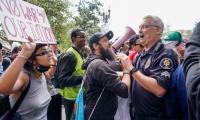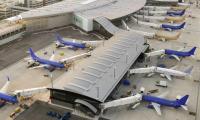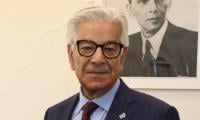Says he had positive discussion with Modi during latter’s brief visit to Lahore; two countries can’t live together in animosity forever; lays foundation of CPEC’s Western route
ZHOB: Prime Minister Nawaz Sharif said on Wednesday that relations with India would not be derailed.
Commenting for the first time about the Lahore stopover by Indian Prime Minister Narendra Modi on Friday last, Prime Minister Nawaz Sharif said that he had positive discussions with the Indian prime minister as the two countries could not live together forever under the umbrella of animosity since it was the need of the hour to settle the disputes through negotiations.
“The disputes are to be sorted out in an atmosphere of goodwill and friendship,” he reiterated.
Prime Minister Nawaz Sharif said this while addressing a huge gathering of political parties’ workers and leaders on Wednesday after laying the foundation for the construction of Western carriageway of the China-Pakistan Economic Corridor (CPEC).
The leadership of all the political parties which were having reservations previously about the route joined the prime minister in unveiling the foundation stone as their grievances had been addressed adequately. The leaders who participated in the ceremony included JUI-F chief Maulana Fazlur Rehman, PkMAP leader Mahmood Khan Achakzai, ANP’s Mian Iftikhar Hussain, PML-Q’s Senator Mushahid Hussain Sayed and NP’s Mir Hasil Khan Bizenjo, National Security Adviser (NSA) Lieutenant General (retd) Nasser Khan Janjua, Minister for Safron Lt General (retd) Abdul Qadir Baloch and former minister Abbas Khan Afridi.
An upbeat Prime Minister Nawaz Sharif said that he was grateful to Indian Prime Minister Modi for coming to Lahore to spend a few hours here. He through sagacity and peaceful means and not through belligerence.
About ties with the neighbouring countries, the prime minister reminded that Adviser on National Security (NSA) had held positive meeting with his Indian counterpart in Bangkok to sort out issues, followed by a visit of Indian External Minister.
He recalled that Iran had settled its nuclear dispute through talks and acumen approach. Before the settlement of the issue, it was feared that Iranian facilities could be bombarded any time but sense prevailed. He paid rich tribute to US President Barrack Obama for displaying sagacity in the matter and got the entanglement settled.
The prime minister announced to convert Karachi-Gwader coastal high way into Motorway and instructed the National Highways Authority (NHA) to renovate the highway that had been damaged due to negligence of the previous governments. Prime Minister Nawaz Sharif indicated that the government would plan to connect with China through railways that had been linked with northern German port city, Hamburg. He said that a huge amount of Rs200 billion would be spent in the next three to four years in Balochistan for alleviating its backwardness. There was no precedent in the history of Balochistan that construction work on massive road network continued on such a fast track, he added.
The prime minister said that up-gradation of the roads would be completed within next two years besides, completion of entire 2,428kms road network linking other provinces with Balochistan. He said as part of CPEC 194km road from Gwadar to Khushab would be inaugurated next month whereas Khushab-Panjgur-Basima 454km road would be completed by December 16 by the FWO. Khuzdar-Wanguhil-Shahdad Kot, 243km road would also be completed by the next year, he said adding that all these projects were being funded by the government of Pakistan out of its Public Sector Development Programme (PSDP).
The prime minister also referred to Kalat-Quetta-Chaman and Kharan phase-1 roads which would be completed in the next year while feasibility work on Zhob-Jandola road was being done. He said uplift of the province was the top priority of his government as it would benefit the entire country. The project would open up opportunities of trade and business for the whole region and help in removing backwardness of the province. Soon, there will be dawn of prosperity of which Balochistan would be the major source of fast track progress, he said.
He expressed the hope that all the political parties would collectively work for the national prosperity and against terrorism and play their due part for the durable peace and prosperity.
The prime minister said that individually, he could not perform such tasks and thanked the political leaders accompanying him for their support. The prime minister regretted that had such rights been given to Balochistan in the past and there was continuity in the development projects, there would have not been any backwardness.
Referring to the development of Gwadar port, the prime minister said that it was a separate entity and required special attention as a state-of-the-art airport was under construction there. He reminded the people that the Karachi-Gwadar costal highway was also constructed during his previous government.
Prime Minister Nawaz Sharif said that Gwadar would be connected with the entire Central Asian Countries (CARs) and cited China-Germany goods railroad which also offered greater connectivity opportunities to Pakistan. “We have to see it in the wider perspective which can be beneficial for our industrial and agricultural sectors,” he added.
The prime minister also pointed out power shortfall that was created by the previous regime. He said that now his government was burdened to overcome such shortcomings, he said. The prime minister said that the government was indebted to China for investing in the power projects including Bin Qasim coal-fired power plant. The country had coal reserves in abundance which were being tapped for generating power. The Turkmenistan-Afghanistan-Pakistan-India (TAPI) gas pipeline would help the component countries of the project get ample gas supply and overcome gas shortage, he said. “All the economic indicators of the country are showing upward trends and we have to move forward,” the prime minister said. Nawaz Sharif felicitated newly elected Balochistan Chief Minister Sanaullah Zehri and Raheela Durrani for becoming first female speaker of the provincial assembly.
Prior to return to the federal capital, Prime Minister Nawaz Sharif while talking to media expressed optimism that Pakistan-India ties would improve in the days ahead and the spirit of goodwill came forth with Prime Minister Narendra Modi’s visit would continue to prevail. Prime Minister Nawaz said that goodwill gestures were solution to many ills. The prime minister was of the view that all issues could be resolved through negotiations as Modi’s visit on December 25, was a step in this direction.
To a query about the gathering of political leadership of all shades at the event, the prime minister said it was a good gesture as all were together at a national event that would usher in an era of progress and development in the country.
Prime Minister Nawaz Sharif inaugurated the western route of the CPEC in Zhob and laid the foundation stones of two key projects: up-gradation of the Zhob-Mughal Kot section of the Dera Ismail Khan-Qila Saifullah Highway (N-50) and the Qilla Saifullah-Waigam Rud Road section of the Multan-Dera Ghazi Khan-Qilla Saifullah Highway (N-70). The Zhob-Mughal Kot Section is part of the western route of the CPEC which starts from Burhan on the Peshawar-Islamabad motorway (M-1), and after passing through DI Khan, Zhob, Quetta, Surab and Hoshab, ends at Gwadar. The Zhob-Mughal Kot section is 81km long and its up-gradation will cost Rs9 billion, and is expected to be completed by 2018. The Qilla Saifullah-Waigam Rud section is 128km long and will cost around Rs8 billion.
The prime minister was also briefed on the projects. National Highway Authority Chairman Shahid Ashraf Tarar while addressing the inauguration ceremony said that the motorways and expressways in Pakistan in the next three years would be expanded manifold. From Khunjerab to Gwadar, all areas would be connected through motorways, he said, adding that the routes would make it easier for traders to have easy access to the markets.
Khawar Manika's counsel continued his arguments on Wednesday in a petition filed by Imran Khan and Bushra Bibi
IHC reserved judgment on the petition against registration of cases against former interior minister Sheikh Rashid on...
Saudi woman who was reportedly kidnapped from Islamabad’s residential Sector F-8 in mysterious circumstances, has...
Pakistan Navy warship rescued 8 Iranian fishermen after their boat caught fire in the open sea
SC dismissed appeal against SHC order that turned down application of partner seeking extension of time to furnish...
Executive board of International Monetary Fund will meet on April 29 to discuss the approval of $1.1 billion funding...







